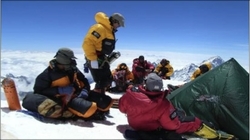The Caudwell Xtreme Everest expedition of the The Centre for Aviation, Space & Extreme Environmental (CASE) Medicine at UCL was already mentioned here on DB by Turtle in this thread:
http://forums.deeperblue.com/freediving-science/79064-hypoxia-testing-medical-science-london.html
I stumbled now over a new report from the expedition with the title reused in the subject of this thread:
Caudwell Xtreme Everest
http://forums.deeperblue.com/freediving-science/79064-hypoxia-testing-medical-science-london.html
I stumbled now over a new report from the expedition with the title reused in the subject of this thread:
Caudwell Xtreme Everest
I hope Turtle will peek in at tell us little bit more details and conclusions from the research. Also, knowing the results of the tissue hypoxia research mentioned in the other thread would be interesting. Perhaps we soon start seeing freedivers (and athletes in other sports) strangling their limbs before the performance to prepare the body for the hypoxia.The purpose of the study was to establish what has long been suspected – that high-altitude climbers have incredibly low levels of oxygen in their blood, which at sea-level would only be seen in patients close to death. The expedition found the average arterial oxygen level to be 3.28 kilopascals or kPa (with the lowest value being 2.55 kPa); the normal value in humans is 12-14 kPa and patients with a level below 8 kPa are considered critically ill. Based on calculations of the expected level of oxygen in the blood, the authors also speculate that accumulation of fluid in the lungs as a result of the high altitude might have contributed to the low oxygen levels.



